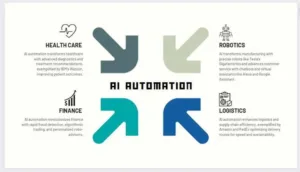What is Automation in industry
In our rapidly evolving technological landscape, Artificial Intelligence (AI) has emerged as a paramount catalyst, revolutionizing industries and reshaping the very core of our workforce. AI is reshaping industries and work. AI automation, a transformative aspect, boosts efficiency, cuts costs, and opens new possibilities. This discussion explores AI automation’s impact on various industries and its vast potential.
AI automation is the embodiment of AI’s remarkable ability to delegate tasks and processes, obviating the necessity for human intervention. Its application spans the gamut, from mundane, repetitive chores to intricate decision-making protocols. Its cardinal aim remains to streamline operations, enhance precision, and augment productivity to previously unattainable levels.

Manufacturing and Robotics:
In the world of AI automation, manufacturing is a standout example. AI-powered robots are built for precise and consistent tasks, reducing defects and costs. Manufacturers use AI and machine learning to optimize production, predict maintenance, and minimize downtime. Real-time monitoring prevents costly breakdowns. Robots with AI adapt to changes on the factory floor, working with humans to improve productivity and safety.
Automation in Manufacturing Examples
Tesla’s Gig factories showcase the successful blend of AI automation in manufacturing. AI-powered robots work alongside human workers, significantly enhancing the production of electric vehicles. This collaboration improves efficiency in tasks such as welding and painting.
Fanuc, a renowned industrial robot manufacturer, offers a variety of AI-equipped robots for tasks like material handling, welding, and painting across different industries. These robots boost precision and efficiency in manufacturing processes.
ABB’s RobotStudio is a valuable software tool for manufacturing automation. It enables manufacturers to optimize their robotic systems and production lines through AI-driven simulations, leading to streamlined processes and cost savings.
In customer service, AI has made strides. Chatbots and virtual assistants use advanced natural language processing to handle inquiries, resolve issues, and offer recommendations. Industry leaders like Amazon and Google have AI-powered virtual assistants like Alexa and Google Assistant, skilled in tasks like reminders and smart home management. They keep learning to better understand and respond to human interactions.
AI Automation in Healthcare
In the healthcare sector, AI automation has initiated a transformative revolution by revolutionizing diagnostic procedures and patient care. This transformative technology encompasses a range of applications, from diagnostic algorithms that can detect diseases with exceptional accuracy to robotic surgical assistants that enhance the precision of complex procedures.
IBM’s Watson is a prime example, assimilating medical literature and patient records to provide insights.
Intelligent automation in healthcare involves the use of AI-driven technologies to enhance various aspects of healthcare delivery. It includes applications like AI-powered diagnostic tools, automated appointment scheduling, and smart monitoring devices. This technology improves patient care, reduces administrative burdens on healthcare providers, and helps in early disease detection.
In healthcare diagnostics AI means using artificial intelligence to analyze medical data and images for disease detection and diagnosis, especially in interpreting medical images like X-rays and MRIs with great accuracy.
AI in Finance and Banking
In finance and banking the Ai involves the application of artificial intelligence to various financial processes and services. AI algorithms are used for fraud detection, risk assessment, and algorithmic trading. In banking, AI-driven chatbots and virtual assistants improve customer service, while robo-advisors provide personalized investment recommendations.
The application of AI in banking automates tasks, enhances customer experiences, and boosts risk management. AI detects fraud, tailors financial products, and automates customer support. AI-powered chatbots offer 24/7 help, while machine learning improves credit risk assessment. It streamlines operations, cuts costs, and offers better services to clients.
AI in corporate banking transforms how banks serve business clients. It uses artificial intelligence to provide advanced financial solutions, streamline operations, and enhance decision-making for businesses. AI algorithms analyze large datasets to offer insights on investments, risks, and financial predictions. They also automate tasks like transactions and data analysis, boosting efficiency and saving costs. Furthermore, AI in corporate banking enables personalized financial services, strengthening the bank-customer relationship and fostering innovation in the sector.
AI in Logistics and Supply Chain
AI in logistics and supply chain management involves the use of artificial intelligence to optimize the movement of goods and materials. AI-powered algorithms predict demand, automate inventory management, and optimize delivery routes. These applications reduce costs, improve efficiency, and enhance overall supply chain operations.
AI in Distribution refers to the use of artificial intelligence to improve the distribution processes of goods and products. AI algorithms help optimize warehouse operations, manage inventory levels, and ensure timely deliveries. This technology is crucial for ensuring that products reach customers efficiently and on time.
AI in Transportation encompasses the use of artificial intelligence to enhance various modes of transportation, including self-driving cars, predictive maintenance for vehicles, and route optimization for logistics. AI-driven transportation solutions strive to enhance safety, efficiency, and sustainability within the transportation sector.
AI in Supply Chain involves the application of artificial intelligence to optimize supply chain processes. AI-powered solutions help businesses forecast demand, manage inventory, and improve supply chain visibility. By leveraging AI, organizations can reduce costs, minimize disruptions, and enhance customer satisfaction within their supply chains.
The Future of AI Automation
Current progress because of AI promises following:

AI automation has immense potential but also comes with challenges. It may replace jobs, but it also creates new opportunities in AI-related fields. We need to address ethical concerns by ensuring fairness, transparency, and accountability to prevent biases. Robust data privacy measures are essential to protect against data breaches and misuse. Overall, AI automation brings innovation and progress but requires responsible handling of its impact.
AI automation, while sometimes complex and costly to implement, offers substantial benefits in efficiency and productivity. Ongoing maintenance, updates, and human oversight are essential for its success, along with comprehensive employee training.
Despite challenges, AI automation is a disruptive force driving innovation and growth. It promises improved efficiency, better decision-making, and an enhanced quality of life through a harmonious blend of human creativity and AI. Responsibility is crucial as we explore this exciting frontier, ensuring AI automation brings positive change to our evolving world
Share This :


4 Responses